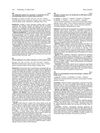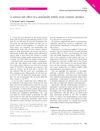14 citations,
December 2021 in “International journal of molecular sciences” Growth hormone levels affect hair growth and loss, with too much causing excess hair and too little leading to hair loss.
 8 citations,
January 2023 in “Biosensors”
8 citations,
January 2023 in “Biosensors” Piezoelectric Nanogenerators are promising for non-invasive health monitoring but need efficiency and durability improvements.
4 citations,
March 2022 in “Pharmaceutics” Regenerative cellular therapies show promise for treating non-scarring hair loss but need more research.
 2 citations,
May 2023 in “Nanomaterials”
2 citations,
May 2023 in “Nanomaterials” Microemulsions could improve skin drug delivery but face challenges like complex creation and potential toxicity.
 2 citations,
January 2023 in “Pharmaceuticals”
2 citations,
January 2023 in “Pharmaceuticals” Natural products and phytochemicals may help with hair regrowth, but more research is needed.
1 citations,
October 2023 in “Biology” Fasting in hens affects thyroid hormones, which regulate feather and hair growth.
 1 citations,
August 2023 in “Bioengineering”
1 citations,
August 2023 in “Bioengineering” PRP may help with aging and osteoarthritis, improving tissue repair and reducing surgery risk.
 1 citations,
July 2023 in “Journal of Clinical Medicine”
1 citations,
July 2023 in “Journal of Clinical Medicine” Different causes of beard hair loss have various treatments, including medications, lifestyle changes, and procedures to stimulate hair growth.
1 citations,
February 2023 in “Plants” BB4CMU rice bran oil may help treat hair loss and gray hair.
 1 citations,
January 2023 in “Biochemical and biophysical research communications”
1 citations,
January 2023 in “Biochemical and biophysical research communications” Keratin 79 is linked to liver damage and may help diagnose liver diseases.
October 2024 in “Acta Biomaterialia” Collagen makes skin stiff, and preservation methods greatly increase tissue stiffness.
 April 2024 in “Prostate international”
April 2024 in “Prostate international” Male pattern baldness does not cause an increased risk of prostate cancer.
Aesthetic rehabilitation techniques can improve life quality and wellbeing for disabled patients.
March 2024 in “Veterinary sciences” Geriatric Julia Creek dunnarts often suffer from reproductive and skin diseases, impacting conservation efforts.
March 2024 in “Molecules/Molecules online/Molecules annual” Enzymatically extracted bear oil has more unsaturated fats and significantly increases hair growth in mice.
January 2024 in “Animals” Circular RNA ERCC6 helps activate stem cells important for cashmere goat hair growth by interacting with specific molecules in an m6A modification-dependent way.
 January 2024 in “Journal of Cosmetics, Dermatological Sciences and Applications”
January 2024 in “Journal of Cosmetics, Dermatological Sciences and Applications” Injecting a peptide-hyaluronic acid mix improved hair growth in men with hair loss and was safe.
 January 2024 in “Journal of Ayurveda and integrative medicine”
January 2024 in “Journal of Ayurveda and integrative medicine” Millets may help reduce chemotherapy side effects like nausea, fatigue, and hair loss.
 August 2023 in “International Journal of Molecular Sciences”
August 2023 in “International Journal of Molecular Sciences” Human skin xenografting could improve our understanding of skin development, renewal, and healing.

New treatments for hair loss should target eight main causes and use specific plant compounds and peptides for better results.
Researchers made a mouse model with curly hair and hair loss by editing a gene.
 June 2023 in “Food frontiers”
June 2023 in “Food frontiers” Ginsenoside CK, found in Panax ginseng, can prevent hair loss by controlling certain growth pathways and promoting hair follicle development.
10 citations,
December 2015 in “International Journal of Dermatology” CK 15, follistatin, and Bmi-1 can help differentiate basal cell carcinoma from squamous cell carcinoma.
 March 2010 in “Ejc Supplements”
March 2010 in “Ejc Supplements” CK 5/6 expression in breast cancer is linked to negative hormone receptor status and higher tumor grade.
 24 citations,
March 2022 in “Frontiers in plant science”
24 citations,
March 2022 in “Frontiers in plant science” Plant root hair growth is mainly controlled by hormones like auxin and ethylene, which promote growth, while others like brassinosteroid inhibit it.
 16 citations,
March 2015 in “Clinical Cancer Research”
16 citations,
March 2015 in “Clinical Cancer Research” The document concludes that side effects from Smoothened inhibitor drugs for skin cancer are reversible and can be managed with a team approach to maintain quality of life.
11 citations,
March 2018 in “Journal of cosmetic and laser therapy” Injecting non-cross-linked hyaluronic acid into the face improved skin hydration, texture, pores, and reduced wrinkles.
 January 2015 in “Journal of Cytology and Histology”
January 2015 in “Journal of Cytology and Histology” Hair loss in Androgenetic Alopecia is not caused by damage to follicular stem cells.
December 2021 in “Pathologica” Trichogerminoma is a rare, benign skin tumor from hair cells, with a small risk of becoming cancerous.
 3 citations,
January 2015 in “Clinical and Experimental Dermatology”
3 citations,
January 2015 in “Clinical and Experimental Dermatology” A man developed a serious muscle breakdown condition after using a hair loss medication not known to cause this side effect.
















